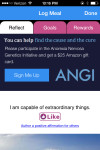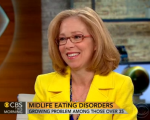Mobile health app helping ANGI to crack genetic code of Anorexia
Mobile health app helping ANGI to crack genetic code of Anorexia
 Recovery Record, the world’s largest mobile eating disorder community for practitioners and patients, is supporting a hallmark study seeking a cure for the eating disorder, Anorexia Nervosa. Outsmarting the Anorexia Nervosa (AN) bully is hard work, 24/7. While recovery is possible at every age, the process of recovery will be much, much easier when scientists understand WHY the illness develops, and can translate findings into life-saving, life-redeeming treatments.
Recovery Record, the world’s largest mobile eating disorder community for practitioners and patients, is supporting a hallmark study seeking a cure for the eating disorder, Anorexia Nervosa. Outsmarting the Anorexia Nervosa (AN) bully is hard work, 24/7. While recovery is possible at every age, the process of recovery will be much, much easier when scientists understand WHY the illness develops, and can translate findings into life-saving, life-redeeming treatments.
Researchers acknowledge that there is a genetic component – that Anorexia is a biologically-based psychiatric disorder – but to discover how and why this illness develops in one person and not another, they need our help. In short, they need 25,000 blood samples to explore our DNA. If, like me, you have experienced AN, this is your chance to ‘get back’ at the illness that has affected your life; this is your chance to make your experience count in helping others who may be vulnerable to developing the illness in the future.

Prof. Nick Martin, Queensland Institute Medical Research, Prof. Cynthia Bulik (University North Carolina and chief investigator) and me, June-the-survivor-advocate, at the ANGI launch.
Just over a year ago I helped to launch the Anorexia Nervosa Genetics Initiative (ANGI) campaign with Professors Cynthia Bulik and Nick Martin, in Brisbane, Australia. Donating blood for this research was one of the happiest days of my life.
To know that I was contributing to the search to find the answer to the illness that had kept me a prisoner of my self for more than four decades, (from age 11 to 55), was magnificently meaningful and cathartic. Already, hundreds of sufferers of Anorexia have donated blood samples, but genetics research has traditionally been hampered by difficulty attaining large sample sizes and many more samples are required. The word needs to be spread, far and wide.
This week’s announcement of the innovative partnership between Recovery Record and the genetic researchers, gives the ANGI call a boost in both rigour and reach. ![]() Recovery Record mobile app users are being invited to participate in the ANGI research study with the goal of identifying specific genes that contribute to Anorexia Nervosa. Every sample will assist the researchers in their endeavour to advance prevention and more effective treatment opportunities. This strategic partnership is an example of the growing power of mobile health apps. Led by Professor Cynthia Bulik and a team of investigators at the University of North Carolina at Chapel Hill and the Queensland Institute of Medical Research, Australia, ANGI represents the largest and most rigorous global effort to detect genetic variations that contribute to eating disorders.
Recovery Record mobile app users are being invited to participate in the ANGI research study with the goal of identifying specific genes that contribute to Anorexia Nervosa. Every sample will assist the researchers in their endeavour to advance prevention and more effective treatment opportunities. This strategic partnership is an example of the growing power of mobile health apps. Led by Professor Cynthia Bulik and a team of investigators at the University of North Carolina at Chapel Hill and the Queensland Institute of Medical Research, Australia, ANGI represents the largest and most rigorous global effort to detect genetic variations that contribute to eating disorders.
Size matters when it comes to detecting causal genes of human diseases. AN25K is a benchmark and reflects the audacious goal of collecting the 25,000 DNA samples globally from people like you and me who have had Anorexia Nervosa at any time in their life by 2016. ANGI selected industry leader Recovery Record because of their commitment to scientific methodology and user base size. Recovery Record provides a secure, free and seamless way for people with eating disorders to receive evidence based treatment components. The application has achieved unprecedented adoption in a typically tough to reach group. Since its inception in 2012, more than 6,000,000 therapeutic assignments have been completed by almost 200,000 people with eating disorders. Professor Bulik explains:
“My work in this field has spanned four decades. Never have I seen such an outpouring of community and desire to ‘give back’ by people who have suffered from this pernicious illness. My life’s passion is to figure out Anorexia Nervosa and to prevent any further loss of life. I can’t do it without partners with reach like Recovery Record and every single person who signs up to participate in ANGI. I know 25K is a lofty goal, but together we can show the world how the eating disorder community can band together to find a cause and a cure.”
Jenna Tregarthen, co-founder and CEO of Recovery Record, says:
“We are in the unique and exciting position to be able to connect our users with the choice to contribute in a vitally important way to understanding and treating Anorexia Nervosa. This is consistent with our value of empowering people to be at the center of their own care. We believe that cutting‐edge technology and genetics research will open doors to personalized treatment for eating disorders and make a meaningful impact to reduce incidence in the not too distant future.”
Who is eligible to help?
If you have Anorexia Nervosa, or if you have had it in the past, you can help by taking part. If you have a patient, friend or family member with anorexia nervosa, you can help by referring them to ANGI.
What is involved?
The process has three stages:
* Complete a short survey in your Recovery Record app or here to determine eligibility
* If you are eligible, you are invited to complete a brief 30‐minute questionnaire
* Roll up your sleeves to provide a blood sample for science!
Who to contact
US ANGI: http://www.unceatingdisorders.org/angi
Australia ANGI: https://angi.qimr.edu.au/
Roll up in the UK – Charlotte’s Helix
Opportunities to participate in Anorexia Nervosa genetics research also exist if you live in the UK! Visit the Charlotte’s Helix website for more information: https://www.charlotteshelix.net/add-your-dna-to-an25k.html







